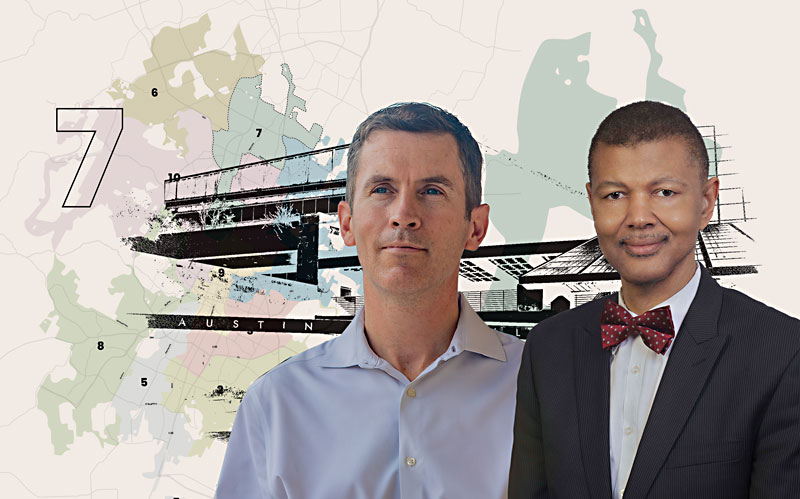District 7 Runoff Is a Battle Between Austin’s New and Old Political Generations
Mike Siegel and Gary Bledsoe face off Dec. 14
By Austin Sanders, Fri., Dec. 6, 2024

The race to decide the final makeup of Austin’s next City Council is underway, with Mike Siegel and Gary Bledsoe barreling toward the Dec. 14 election date in the District 7 runoff.
In the Nov. 5 election, Sigel finished well ahead of the field, taking in nearly 40% of the vote compared to Bledsoe’s 19%. The challenge facing Siegel in the runoff is not necessarily one of persuading voters, but in moving enough of the 13,000 people who voted for him in November to return to the polls and vote for him again in December.
That could be a challenge, given Siegel’s support likely skewed younger given his affiliation with more youthful, leftist organizing groups like Equity Action, Ground Game TX, and Democratic Socialists of America. But younger voters are less likely to turn out in runoff elections. Bledsoe is unlikely to face that problem. He is a member of Austin’s old political guard and has been embraced by some of the Democratic clubs that represent those voters – which also happen to be the kind of voters who are more likely to vote in runoff elections.
The election of either candidate is unlikely to change the balance of power on the dais as it relates to housing – the local issue that city government has the most control over – even though the candidates do have opposing views on the topic. Siegel has embraced the kind of changes Council has made to Austin’s housing rules over the past two years – changes that, broadly, have made it easier to build more housing throughout the city. Bledsoe has been skeptical of those changes, particularly with regard to the way Council enacted them, which he characterizes as having limited public participation.
But regardless of who wins, the next Council is likely to be even more pro-housing than in the previous two years, because D6’s Mackenzie Kelly was defeated by challenger Krista Laine. That means even if Bledsoe prevails over Siegel, he won’t be able to do much to slow the progress Council is making on reforming the city’s housing policies.
Voters may see a contrast in how the two candidates approach policing. As a civil rights lawyer, Bledsoe has fought cases against police departments around the state, but he says he still has good relationships with police officers that he could leverage into ushering in cultural reforms at the Austin Police Department. Siegel, more recently, has been active in the campaign to create a more robust civilian oversight system of APD (he represented Equity Action in the lawsuit they filed against the city to fully implement the Austin Police Oversight Act).
Both candidates say that they’ll be able to defend Austin values from right-wing threats at the state and federal levels of government – but with different approaches.
Bledsoe is positioning himself as the moderate choice who can better work with state and federal leaders. “My positions are those held by a much wider swath of voters here and they are things that are more likely to be sustained in the courts,” Bledsoe said. “The best remedy against [right-wing threats] is to have buy-in from all segments of our community.”
Siegel, on the other hand, emphasizes his willingness to fight against Greg Abbott, Ken Paxton, and Dan Patrick as an indication of how he’ll be able to defend Austin against growing right-wing power. He also points to his history as a community organizer as another key.
“I have a coalition of stakeholders supporting my campaign, because we’ve worked together and they know we can be effective together at City Hall,” Siegel said. “Taking effective action locally is going to take hard work, especially in the shadow of Trump and Abbott. We’re not going to be able to do that unless we can bring a lot of people together to move forward together.”
Got something to say on the subject? Send a letter to the editor.








